When I go to meet fellow MGRM writer Claire Epting about her latest musical project, Inverted Jenny, we hold the interview at my house—before you yell, “Unprofessional,” SHE offered to come to ME, and being lazy, I obliged! Over the course of our conversation, we talk about the band’s debut EP, COSMIC CRUSH, the lifecycle of the project, and seeing setbacks as a blessing instead of a curse. She arrives in faded denim bell-bottoms, a tucked-in shirt that read “Gato Y Gato,” and some shabby shell-top Adidas. She asked for some water and apologized for being a tad sweaty, she had just come from playing basketball with some friends. As we’ll come to learn, Claire is not one for lazing about. She wants to get stuff going!
So… congrats!
Claire Epting: Thank you!
How do you feel about it?
CE: It’s been really cool, we were really trying to make sure that the EP would release in time for Planet Moon, which was our college radio station’s Spring Music festival. That was just kind of a personal goal. I feel like a first release is really just a calling card and it’s a chance for people to connect with your music outside of a live setting and really develop a relationship with the music that way. So it was super important to all of us that it was out and we just made it the day of. It’s the second festival that Chapman’s thrown, at the Garden Grove Amphitheater (in Anaheim). Which is so big, it was definitely the largest stage I’ve ever played on.
That must’ve been intimidating.
CE: Yeah, very nerve-racking. It’s crazy because you have, like, 30 seconds to soundcheck. I will say that the people who show up are all friends, so it was a very forgiving audience, very encouraging, so that was cool.
That’s good, but you also have this huge professional setting that you’re playing in.
CE: Yeah, we were able to get some pictures in the action, some group shots. It’s cool, just starting out, anything that you can use to establish yourself or what you’re trying to do. Obviously it’s not perfect, you’re kind of still piecing things together… but it’s great because it’s the starting point for everybody, then you kind of go from there. Hot Flash Heat Wave played a show at the Locker Room a year before, for another little festival, and they were the first band of the day and now… they’re the headliner. It kind of is just cutting your teeth, starting from scratch, and working your way up. It’s been cool. I mean, I always love playing a house party, a house show, but there’s nothing like being on a stage with great equipment and getting to make a lot of noise…
How long have these songs been…?
CE: In wraps?
Yes.
CE: I wrote the four songs around September, October. Basically, I would meet up with the members of my band…
So it is a band?
CE: It is a band. Like anything, roles kind of shift over time, obviously. We had (fellow MGRM contributor) Ted Davis step in when our drummer went abroad. So he’s kind of been the drummer now. I feel like, especially in college, it’s such a collaborative process, people come in and out. I’ve always seen it as a band, even though I do write the lyrics, write the basic song, structures and present them. They then get brought to life.
I always relate it to film: it’s like if someone came in with a logline, a pitch and an idea, and a rough skeleton of the script, and there’s the DP and the production designer, how everyone works to bring it to life. That’s how I felt with these songs. It’s crazy, because I’ll just be in my room and record little riffs and stuff and figure it out… I found one from like a year ago, which is “Fault Line.” So it’s taken that long to develop. It starts out as vocals, electric guitar, then I just pass it off to different people… it kind of became a communist effort. *Laughs* We had a lot of conversations about what needs to be done. It’s easy just to put some chords on paper and be like, “OK, here’s the song.” But how do you craft it into… a fully-formed thing.
Like its own personality.
CE: Exactly.
And bringing each band member’s personality into the song too…
CE: Exactly.
That must’ve been hard to make time.
CE: Yeah, it’s tough… It’s no one’s only thing on their plate. I definitely had to prioritize it a lot. I definitely had to make some sacrifices. It starts to feel like your kid, this thing you pour all of your time and energy into, and when you start seeing it make improvements, it’s so thrilling. But you have to stick with it and give it all of your attention. And you still gotta pass your classes.
Does it feel weird now that it’s over? Was there a high and now it’s the comedown?
CE: I was kind of expecting that, I feel like for me at least because it’s the first release now it’s just, OK, what else can I do? Now that it’s out, who can I send it to? Where can I get it featured? How can I book gigs? Which bands can I start contacting to open for them? Also just getting those plays on Spotify, it’s stupid, but today, plays translate into visibility. It’s just about how many people I can get to listen to it. For me, I’m honestly more excited now because there’s so many doors opened because we’re on the board… now it’s like you type it into Spotify and it pops up. You can kind of start reframing what this project is to you. It’s like now that it’s a real thing, not just in your head, how can you get to that next step? For me, I’m just trying to look forward and really use this as a pole-vault to the next thing.
I noticed the album has this progressive descent into deeper melancholy; was that structure totally purposeful?
CE: Definitely. Taking a four-song EP, I wanted to structure it where two of the songs, like “Cosmic Crush” and “Drift,” are more optimistic and hopeful; “Where Do I Fit In?” and “Fault Lines,” or “Fault Line”—some people have written me, “Oh, I love ‘Fault Lines,’” and now I’ve started saying “Fault Lines”—but yeah, those are a little more downbeat, rooted in a darker core of emotions. I definitely didn’t want it to feel one-note and I also wanted to show, especially for this first release, that we have a range. My dad shared it with his little music friend community and people were saying, “Oh, this is like Mazzy Star… The Cranberries,” and that to me is very exciting, because I love that stuff.
Were you listening to bands like that during the recording?
CE: Absolutely. The thing that’s really important is that all the people I make music with—Ted, Willa Rydall, Ellie Cooper, Fed Busciglio, Ellie Cooper, before she was abroad—is that we all enjoy the same qualities in music and all listen to the same artists. Summer Salt is a huge inspiration for us. Or Big Thief. Mazzy Star. Beach House—which is like the golden standard for music. Just being on the same page about what we wanna be, what we know that we’re not, taking what we have and trying not to be derivative but… just being, like, “What is it about these songs that we like?” That’s something that writing about music has been helpful with, like writing for Merry-Go-Round, just listening to an album a million times and going, “Why does this work?”
Was there one main source of inspiration… not even music-wise, but what was happening in your life?
CE: I feel the basis for the creation of this project was this idea of suburban nostalgia; sounds like a buzzy kind of term, but we’re all in Orange, we’re all in this old-fashioned, quaint place for a prolonged period of time. These are songs you hear from the band in the garage at the end of the cul-de-sac. That kind of feeling of: “This is our home.”
It was recorded in a home right, in Ted’s bedroom?
CE: In Ted’s room, yeah. So it is bedroom pop. *Laughs* What’s nice about it is that you can do as many takes as you want, try as many things as you want, there’s no pressure that your paying a hundred dollars a day to get this right. I mean, we’ve had every setback in the world, and at the end of the day it was just like, “Let’s re-record it.”
Was there one thing that kept popping up?
CE: We did have an incident…
Are you allowed to talk about it?
CE: Yeah. We were a day away from having the entire thing mixed and I was starting to have doubts about some of the songs. I was like, “Ted, I might wanna add some things…” and he said, “Let’s see what we can do, come in tomorrow.” And I get a text message, Ted saying that there had been a ‘water related incident.’ *Laughs* And he didn’t realize it, so it went the entire night just covered in water; he’s flipping out, I’m flipping out too. I take it to a Macbook recovery shop and they’re like, “We can tell you in a week if we can fix it.” So all of a sudden there’s like this huge thing and we go, “OK, we gotta re-record it. We just gotta plan to re-record it, if it gets fixed, great. If not, we have to re-record.” All the files were lost. We had to re-record the entire EP except for “Fault Line,” because my friend asked me if she could use it in her film, so we sent her the WAV. file to that song; so it’s the only one that survived the wreckage. Which I’m actually glad, because I would’ve hated to do that one again because that’s my favorite, I wouldn’t have wanted to change anything. But we had to re-do, literally, every part.
That’s my worst fear, for writing, you can’t even imagine starting again.
CE: It was so tough. It felt like my kid was in the hospital. It was the most insane two weeks of my life.
You re-recorded everything in two weeks?
CE: We re-recorded it all in one day basically. We locked ourselves in Ted’s room and I’m like, “We’re not leaving until it’s done.” I think what it taught me, at a certain point, you just gotta get it out into the world. It’s never going to be perfect and there’s always things, things that I hear that I go, “Fuck, I really wish I could change that.” The mentality becomes: how can I improve it for the future… but you have to make peace with it in the past. We’re all in college, we’re all just doing our best, so that became the mentality: let’s just get this fucking thing out there and… it can live. The good, forgiving thing about lo-fi is that if it sounds kind of shitty…
That’s the point.
CE: That’s what people like, they’re like, “I can relate to that.”
What’s your definitive next step? Who would you love to open for?
CE: Oh my gosh. Summer Salt for me. That’s huge. That’s definitely a goal for me, but like, a couple-year-goal. In the next year or so, I’d love to start linking up with Chapman alumni artists. That would be cool to start opening for artists that I’m impressed by and that I know personally. I would love to start getting some stuff going… Obviously with graduation, that’s weird. I think the best part with music is that it will always find a way… everybody is just trying to figure it out, it’s not this hard-and-fast set thing, where you’re doing it right or doing it wrong…
It’ll come together when it comes together.
CE: And it’s usually at the very last minute and you just have to embrace it. It’s part of the fun. It’s scary, but fun.
You can check out Inverted Jenny’s COSMIC CRUSH wherever you find music!


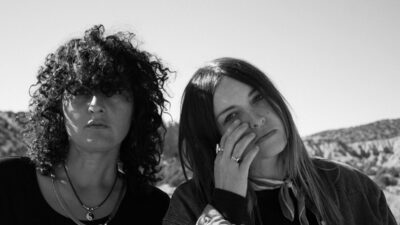
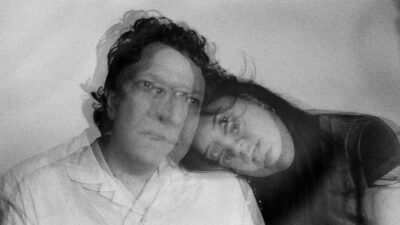
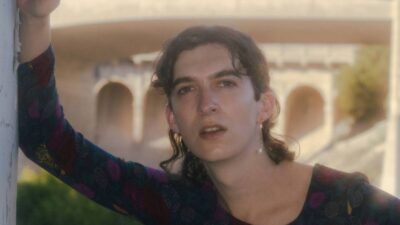


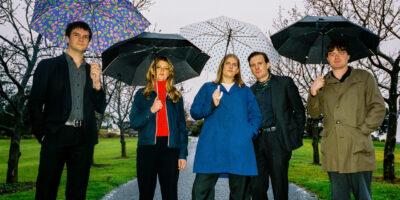
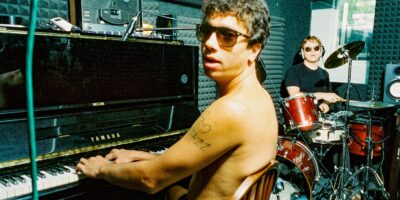
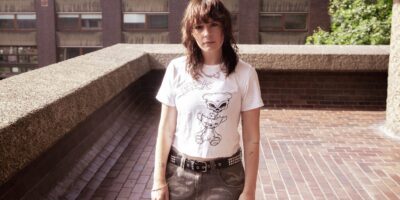
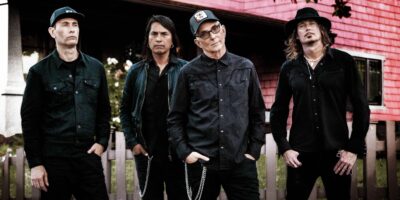
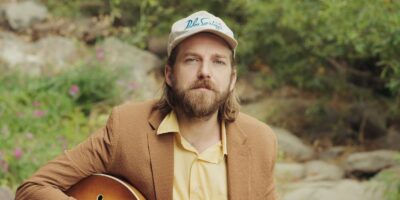
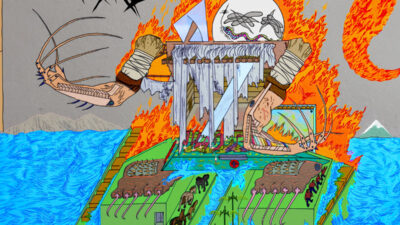

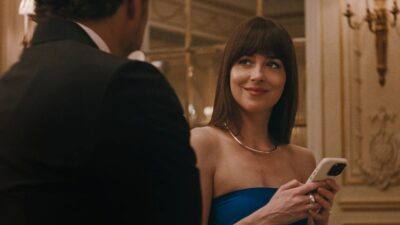
Comments